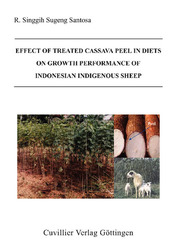| Departments | |
|---|---|
| Book Series (97) |
1383
|
| Nachhaltigkeit |
3
|
| Gesundheitswesen |
1
|
| Humanities |
2379
|
| Natural Sciences |
5409
|
| Mathematics | 228 |
| Informatics | 320 |
| Physics | 980 |
| Chemistry | 1365 |
| Geosciences | 131 |
| Human medicine | 243 |
| Stomatology | 10 |
| Veterinary medicine | 108 |
| Pharmacy | 147 |
| Biology | 835 |
| Biochemistry, molecular biology, gene technology | 121 |
| Biophysics | 25 |
| Domestic and nutritional science | 45 |
| Agricultural science | 1005 |
| Forest science | 201 |
| Horticultural science | 20 |
| Environmental research, ecology and landscape conservation | 148 |
| Engineering |
1799
|
| Common |
97
|
|
Leitlinien Unfallchirurgie
5. Auflage bestellen |
|
Advanced Search
Effect of treated cassava peel in diets on growth performance of indonesian indigenous sheep (English shop)
R. Singgih Sugeng Santosa (Author)Preview
Table of Contents, Datei (89 KB)
Extract, Datei (91 KB)
The very high cost of conventional feeds used in Indonesia for animal feedi ng has Iead to intensified studies on the use of unconventional feed or by-products to reduce cost of production. In recent time, cassava or tapioca meal has been extensively used as replacement for com, but little research effort has been directed to the possibility of using cassava peel (CaP) as feed-stuff for rurninants in the tropics. Reasons include the presence of the toxic cyanogenic glucosides (CG) and low nutrient content. There is a need to eliminate the toxic cyanogenic glucosides in CaP before it is incorporated i nto animal feeding. A si mple method for elimination cyanogenic glucosides and also for improving the nutrient value of CaP is fermentation. This research was set up with the objective to investigate the use of treated CaP (boiled and fermented by SC) in Indonesian indigenous sheep feeding. The treatments were made to improve i ts biological value as feed for sheep by increasing its digestibility and thereby improve body weight gain. To this purpese six experiments were conducted in Anima! Husbandry Jenderal Seedirman University Purwokerto, Central Java, lndonesia using 24 thin -tailed lndonesian indigenous sheep.
| ISBN-13 (Printausgabe) | 3865370195 |
| ISBN-13 (Hard Copy) | 9783865370198 |
| ISBN-13 (eBook) | 9783736910195 |
| Final Book Format | A5 |
| Language | German |
| Page Number | 118 |
| Edition | 1 Aufl. |
| Volume | 0 |
| Publication Place | Göttingen |
| Place of Dissertation | Göttingen |
| Publication Date | 2004-03-29 |
| General Categorization | Dissertation |
| Departments |
Agricultural science
|








